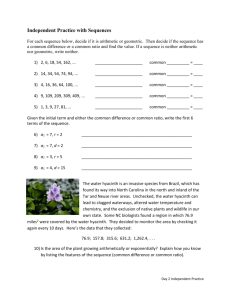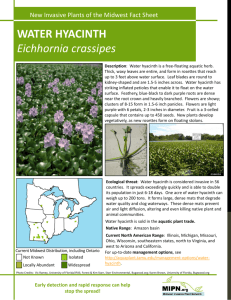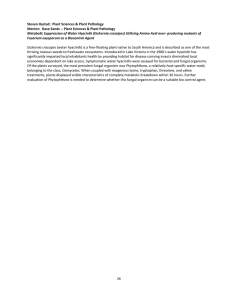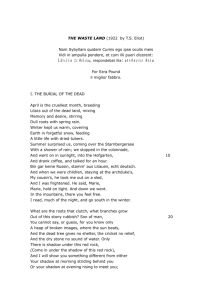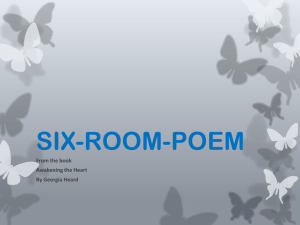ihum21b-week3-a - Stanford University
advertisement
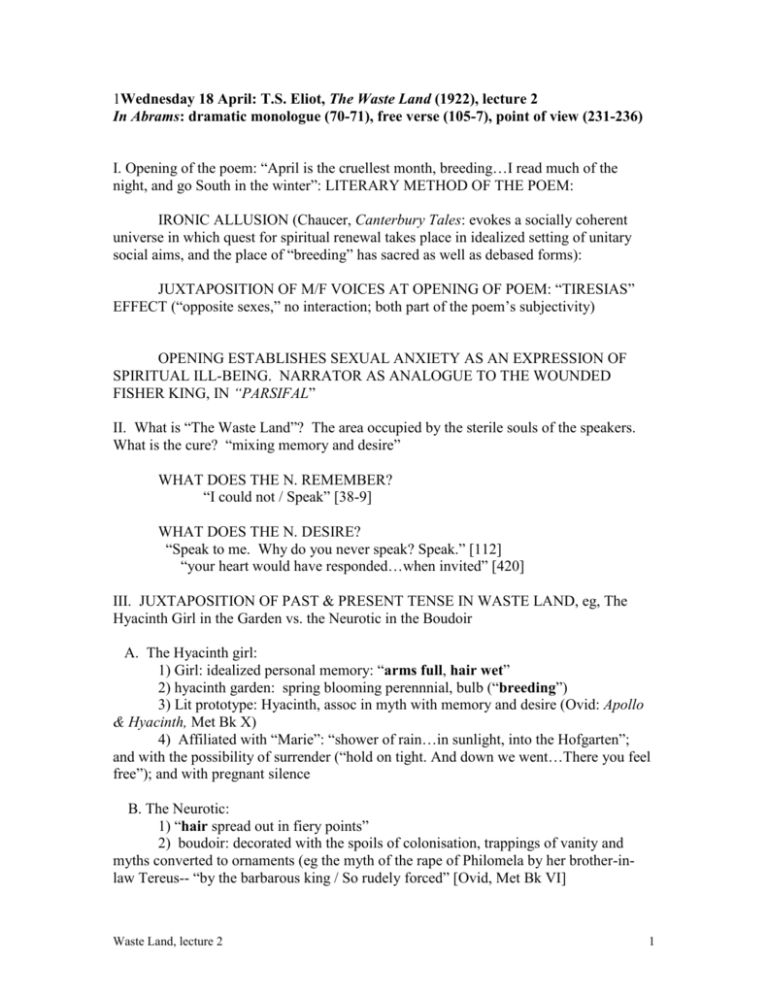
1Wednesday 18 April: T.S. Eliot, The Waste Land (1922), lecture 2 In Abrams: dramatic monologue (70-71), free verse (105-7), point of view (231-236) I. Opening of the poem: “April is the cruellest month, breeding…I read much of the night, and go South in the winter”: LITERARY METHOD OF THE POEM: IRONIC ALLUSION (Chaucer, Canterbury Tales: evokes a socially coherent universe in which quest for spiritual renewal takes place in idealized setting of unitary social aims, and the place of “breeding” has sacred as well as debased forms): JUXTAPOSITION OF M/F VOICES AT OPENING OF POEM: “TIRESIAS” EFFECT (“opposite sexes,” no interaction; both part of the poem’s subjectivity) OPENING ESTABLISHES SEXUAL ANXIETY AS AN EXPRESSION OF SPIRITUAL ILL-BEING. NARRATOR AS ANALOGUE TO THE WOUNDED FISHER KING, IN “PARSIFAL” II. What is “The Waste Land”? The area occupied by the sterile souls of the speakers. What is the cure? “mixing memory and desire” WHAT DOES THE N. REMEMBER? “I could not / Speak” [38-9] WHAT DOES THE N. DESIRE? “Speak to me. Why do you never speak? Speak.” [112] “your heart would have responded…when invited” [420] III. JUXTAPOSITION OF PAST & PRESENT TENSE IN WASTE LAND, eg, The Hyacinth Girl in the Garden vs. the Neurotic in the Boudoir A. The Hyacinth girl: 1) Girl: idealized personal memory: “arms full, hair wet” 2) hyacinth garden: spring blooming perennnial, bulb (“breeding”) 3) Lit prototype: Hyacinth, assoc in myth with memory and desire (Ovid: Apollo & Hyacinth, Met Bk X) 4) Affiliated with “Marie”: “shower of rain…in sunlight, into the Hofgarten”; and with the possibility of surrender (“hold on tight. And down we went…There you feel free”); and with pregnant silence B. The Neurotic: 1) “hair spread out in fiery points” 2) boudoir: decorated with the spoils of colonisation, trappings of vanity and myths converted to ornaments (eg the myth of the rape of Philomela by her brother-inlaw Tereus-- “by the barbarous king / So rudely forced” [Ovid, Met Bk VI] Waste Land, lecture 2 1 3) Literary prototypes: Cleopatra (Shakespeare), Belinda (Rape of the Lock) etc 4) Affiliated with all females in the poem that disgust and threaten the speaker in his embodiment of the plight of the Fisher King IV. HOW DOES THE ENDING GIVE CLOSURE? ACTION: Thunder says DA [a Sanskrit phoneme: smallest unit of speech sound] Gods, Demons & Men hear different messages (but all are aspects of the Mind of the poem) The speaker disciplines himself to openness through repetition of the mantra MEANINGS? Give—from your own memory. Sympathize— recognize your own spiritual isolation and acknowledge that of the Other; Control— attune yourself to the Other Waste Land, lecture 2 2
